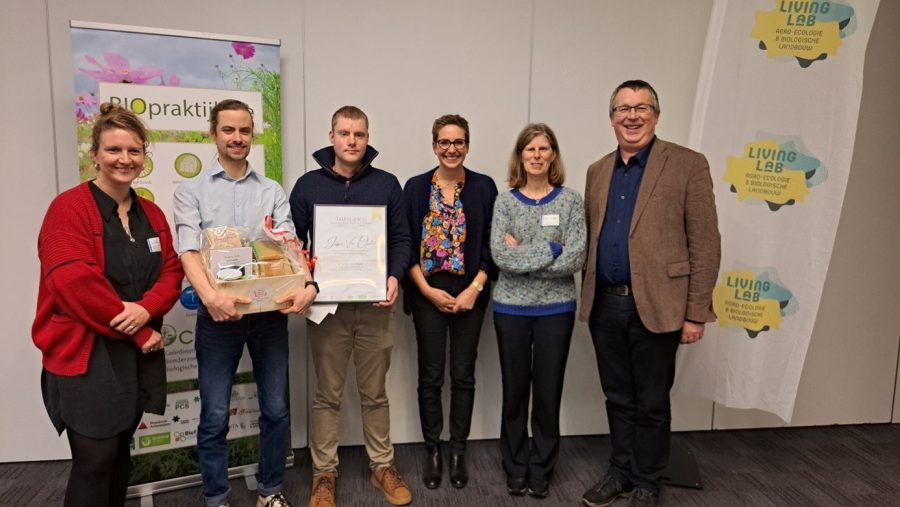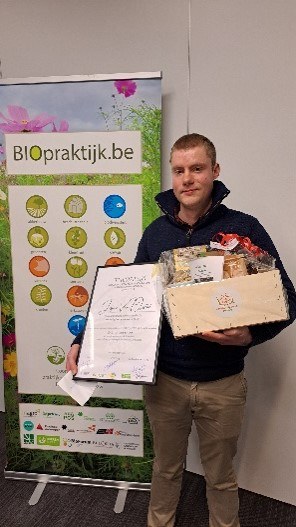General The Living Lab for Agroecology and Organic Agriculture co-presents the thesis prize 'Organic Agriculture and Agroecology' during Agriflanders
On January 12 during Agriflanders (in Ghent, Belgium) at the seminar 'Organic, a choice for the future', the thesis prize for organic agriculture and agroecology was awarded for the third time by the Flemish BioKennisNetwerk (Biobusiness Networks CCBT, Living Lab Agroecology and Organic Agriculture). Jasper Van Opstal, a graduate of KULeuven, received a cash prize of 500 euros and congratulations from the jury for his master's thesis "Feasibility of green manures in an organic production method.'

Green manures are crops that are cut, chopped and used as plant fertilizer on a different field than where they grew. They are used to provide nitrogen to a crop without exceeding the standard for phosphate. Current manure legislation combined with the often unfavorable nitrogen-to-phosphorus ratio in livestock manure often limit the amount of livestock manure that can be used. For this reason, cut manures are becoming an increasingly suitable alternative as a fertilizer source. Jasper's thesis aimed to investigate the feasibility of these cuticle fertilizers.
At the seminar 'Organic, a choice for the future', the thesis prize for organic agriculture and agroecology was awarded for the third time. Jasper Van Opstal, graduated from the KULeuven, received a cash prize of 500 euro, sponsored by CCBT, for his master's thesis 'Feasibility of cutting fertilizers in an organic production method'. His research was supervised by Prof. Hilde Vandendriessche (KULeuven/Bodemkundige Dienst België) and co-supervisors Dr. Annemie Elsen and Helena Vanrespaille (Bodemkundige Dienst België) and was part of the VLM research projectt ‘Samen werken aan optimalisering van bemestingsstrategieën vanuit de principes van de biologische landbouw’ of ILVO, Ugent, Inagro, pcfruit and the Soil Service of Belgium.

In addition to the winner, two other graduates were nominated:
Johanna Daems - Food forests mapped: species used, systems and drivers - Promoters: Prof. Dr. ir. Kris Verheyen and Prof. Dr. ir. Jan Mertens - Ghent University - Faculty of Bioscience Engineering
Mathijs Hast - The ant Crematogaster scutellaris as a biological control agent of Spodoptera littoralis and its interaction with the lacewing Chrysoperla carnea.- Promotors: Prof. Dr. Patrick De Clercq and Dr. Bruno Gobin (PCS) - Ghent University - Faculty of Bioscience Engineering
The jury also showed its appreciation for these works. Their research was also relevant and interesting for the organic sector.
With the presentation of this thesis prize, the Flemish BioKennisNetwork wants to put research for organic and agro-ecological agriculture in the spotlight with students, teachers and by extension also the general public. This should strengthen the link between higher education and research.
The prize is awarded biannually. Do you know students who are currently writing a thesis relevant to the organic sector? Please let us know! Students who have yet to choose a topic and are interested in organic agriculture or the agroecological transition are also very welcome to Bioforum, CCBT or LLAEBIO.
Do you have any questions? Contact Lieve De Cock (LLAEBIO-ILVO), lieve.decock@ilvo.vlaanderen.be or Carmen Landuyt (CCBT) carmen.landuyt@ccbt.be
The Flemish BioKennisNetwerk is a collaboration between Biobedrijfsnetwerken(Bioforum), CCBT and LLAEBIO (ILVO) and the stakeholders of these three networks. Their goal is to stimulate and strengthen research and knowledge exchange for the organic sector in Flanders. The networks cooperate and coordinate their activities to achieve an efficient knowledge policy for the Flemish organic sector.